The Only Girl may refer to:
- The Only Girl (book), a 2018 memoir by Robin Green
- The Only Girl (film), 1933 film
- The Only Girl (musical), 1914 Broadway musical by Victor Herbert and Henry Blossom
The Only Girl may refer to:
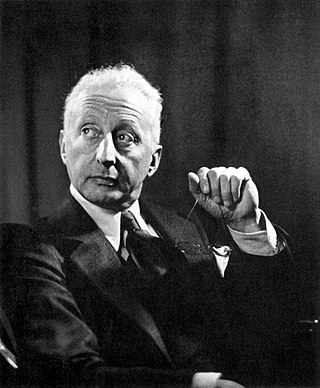
Jerome David Kern was an American composer of musical theatre and popular music. One of the most important American theatre composers of the early 20th century, he wrote more than 700 songs, used in over 100 stage works, including such classics as "Ol' Man River", "Can't Help Lovin' Dat Man", "A Fine Romance", "Smoke Gets in Your Eyes", "The Song Is You", "All the Things You Are", "The Way You Look Tonight" and "Long Ago ". He collaborated with many of the leading librettists and lyricists of his era, including George Grossmith Jr., Guy Bolton, P. G. Wodehouse, Otto Harbach, Oscar Hammerstein II, Dorothy Fields, Johnny Mercer, Ira Gershwin and Yip Harburg.

Moulin Rouge! is a 2001 jukebox musical romantic drama film directed, produced, and co-written by Baz Luhrmann. It follows a young English poet, Christian, who falls in love with the star of the Moulin Rouge, cabaret actress and courtesan Satine. The film uses the musical setting of the Montmartre Quarter of Paris and is the final part of Luhrmann's "Red Curtain Trilogy," following Strictly Ballroom (1992) and Romeo + Juliet (1996). A co-production of Australia and the United States, it features an ensemble cast starring Nicole Kidman and Ewan McGregor, with John Leguizamo, Jim Broadbent, Richard Roxburgh, Jacek Koman and Caroline O'Connor featured in supporting roles.
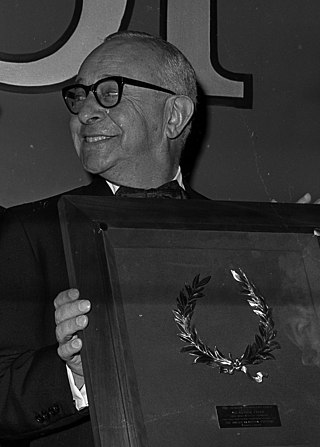
Arthur Freed was an American lyricist and Hollywood film producer. He won the Academy Award for Best Picture twice, in 1951 for An American in Paris and in 1958 for Gigi. Both films were musicals. In addition, he produced and was also a co-lyricist for the film Singin' in the Rain.
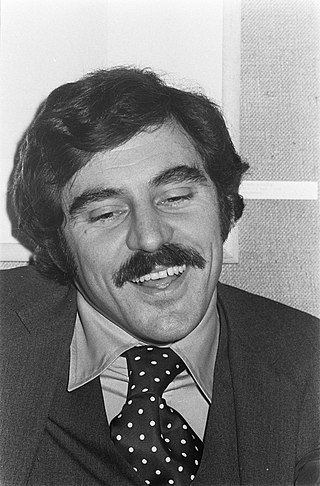
Anthony Newley was an English actor, singer, songwriter, and filmmaker. A "latter-day British Al Jolson", he achieved widespread success in song, and on stage and screen. "One of Broadway's greatest leading men", from 1959 to 1962 he scored a dozen entries on the UK Top 40 chart, including two number one hits. Newley won the 1963 Grammy Award for Song of the Year for "What Kind of Fool Am I", sung by Sammy Davis Jr., and wrote "Feeling Good", which became a signature hit for Nina Simone. His songs have been performed by a wide variety of artists including Fiona Apple, Tony Bennett, Barbra Streisand, Michael Bublé and Mariah Carey.

Edna Mae Durbin, known professionally as Deanna Durbin, was a Canadian-born actress and singer, who moved to the USA with her family in infancy. She appeared in musical films in the 1930s and 1940s. With the technical skill and vocal range of a legitimate lyric soprano, she performed many styles from popular standards to operatic arias.
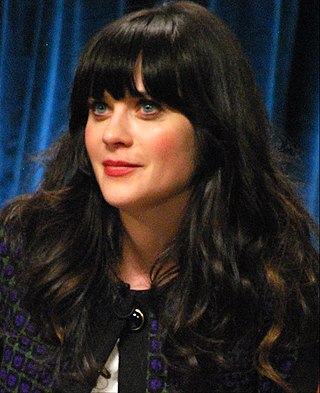
Zooey Claire Deschanel is an American actress and musician. She made her film debut in Mumford (1999) and had a supporting role in Cameron Crowe's film Almost Famous (2000). Deschanel is known for her deadpan roles in comedy films such as The Good Girl (2002), The New Guy (2002), Elf (2003), The Hitchhiker's Guide to the Galaxy (2005), Failure to Launch (2006), Yes Man (2008), 500 Days of Summer (2009) and Our Idiot Brother (2011). She has also ventured into dramatic film territory with Manic (2001), All the Real Girls (2003), Winter Passing (2005), Bridge to Terabithia (2007), The Happening (2008) and The Driftless Area (2015). From 2011 to 2018, she starred as Jessica Day on the Fox sitcom New Girl, for which she received nominations for a Primetime Emmy Award and three Golden Globe Awards.

Joseph Herman Pasternak was a Hungarian-American film producer in Hollywood. Pasternak spent the Hollywood "Golden Age" of musicals at MGM Studios, producing many successful musicals with female singing stars like Deanna Durbin, Kathryn Grayson and Jane Powell, as well as swimmer/bathing beauty Esther Williams' films. He produced Judy Garland's final MGM film, Summer Stock, which was released in 1950, and some of Gene Kelly’s early breakthrough roles. Pasternak worked in the film industry for 45 years, from the later silent era until shortly past the end of the classical Hollywood cinema in the early 1960s.
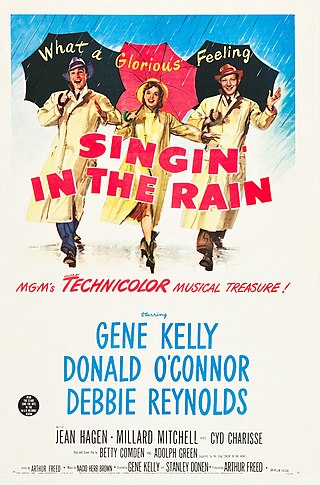
Singin' in the Rain is a 1952 American musical romantic comedy film directed and choreographed by Gene Kelly and Stanley Donen, starring Kelly, Donald O'Connor, and Debbie Reynolds and featuring Jean Hagen, Millard Mitchell and Cyd Charisse. It offers a lighthearted depiction of Hollywood in the late 1920s, with the three stars portraying performers caught up in the transition from silent films to "talkies".
Hairspray is a 2007 musical romantic comedy film based on the 2002 Broadway musical of the same name, which in turn was based on John Waters's 1988 comedy film of the same name. Produced by Ingenious Media and Zadan/Meron Productions, and adapted from both Waters's 1988 script and Thomas Meehan and Mark O'Donnell's book for the stage musical by screenwriter Leslie Dixon, the film was directed and choreographed by Adam Shankman and has an ensemble cast including John Travolta, Michelle Pfeiffer, Christopher Walken, Amanda Bynes, James Marsden, Queen Latifah, Brittany Snow, Zac Efron, Elijah Kelley, Allison Janney, and Nikki Blonsky in her feature film debut. Set in 1962 Baltimore, Maryland, the film follows the "pleasantly plump" teenager Tracy Turnblad (Blonsky) as she pursues stardom as a dancer on a local television dance show and rallies against racial segregation.
The Cheetah Girls may refer to:

Once is a 2007 Irish romantic musical drama film written and directed by John Carney. The film stars Glen Hansard and Markéta Irglová as two struggling musicians in Dublin, Ireland. Hansard and Irglová had previously performed music as the Swell Season, and composed and performed the film's original songs.
Gentlemen Prefer Blondes may refer to:
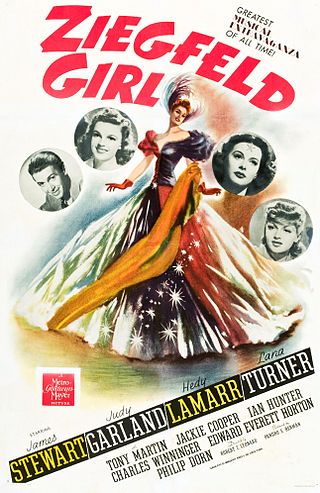
Ziegfeld Girl is a 1941 American musical film directed by Robert Z. Leonard and starring James Stewart, Judy Garland, Hedy Lamarr, Lana Turner, Tony Martin, Jackie Cooper, Eve Arden, and Philip Dorn. The film, which features musical numbers by Busby Berkeley, was produced by Metro-Goldwyn-Mayer.
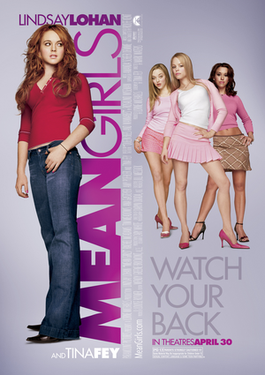
Mean Girls is a 2004 American teen comedy film directed by Mark Waters, written by Tina Fey, and starring Lindsay Lohan, Rachel McAdams, Lacey Chabert, Amanda Seyfried, Tim Meadows, Ana Gasteyer, Amy Poehler and Fey. The supporting cast includes Lizzy Caplan, Jonathan Bennett, Daniel Franzese and Neil Flynn. The screenplay is based in part on Rosalind Wiseman's 2002 book Queen Bees and Wannabes, which describes female high school social cliques, school bullying and the damaging effect they can have on teenagers. Fey also drew from her own experience at Upper Darby High School as an inspiration for some of the concepts in the film. The plot centers on a naïve teenage girl navigating her way through the social hierarchy of a modern American high school after years of her parents homeschooling her while conducting research in Africa. Cady is new and still finding her way to high school.

Funny Girl is a 1968 American biographical musical comedy-drama film directed by William Wyler and written by Isobel Lennart, adapted from her book for the stage musical of the same title. It is loosely based on the life and career of Broadway and film star and comedienne Fanny Brice and her stormy relationship with entrepreneur and gambler Nicky Arnstein.
Funny Girl may refer to:
Dream Girl or dreamgirl may refer to:

Girl Crazy is a 1943 American musical film starring Judy Garland and Mickey Rooney. Produced by the Freed Unit of Metro-Goldwyn-Mayer, it is based on the stage musical Girl Crazy – which was written by Guy Bolton and Jack McGowan, with music and lyrics by George and Ira Gershwin. It was the last of Garland and Rooney's nine movies as co-stars, the pair appearing only once more together on film, as guest stars in 1948's Words and Music.

Heathers: The Musical is a musical with music, lyrics and book by Laurence O'Keefe and Kevin Murphy, based on the 1989 film of the same name written by Daniel Waters. The producers include J. Todd Harris, Amy Powers, RJ Hendricks, and Andy Cohen. After a sold-out Los Angeles tryout, the show moved Off-Broadway in 2014. After the run in 2014, the show had an Off-West End run in 2018 and then transferred to the West End in 2018 for a limited engagement.

Once is a musical based on the 2007 film of the same name by John Carney. Like the film, music and lyrics were by Glen Hansard and Markéta Irglová, including the Academy Award-winning "Falling Slowly". The book for the musical was written by Enda Walsh. The musical premiered at the New York Theatre Workshop in 2011, before transferring to Broadway in 2012. The production received eleven 2012 Tony Award nominations, and won eight including Best Musical, Best Actor and Best Book. The musical also won the 2012 Drama Desk Award for Outstanding Musical and the 2013 Grammy Award for Best Musical Theater Album. It has since spawned a London production, with a North American Tour which started on 1 October 2013. In the musical, the cast also serves as the orchestra. A minimalist set is used, including a bar in center stage with chairs lining stage left and right. Exiting cast members simply step to the side of the stage and sit down. They serve as the orchestra from these chairs. The bar is used before the show and at intermission as a working bar for theater patrons.